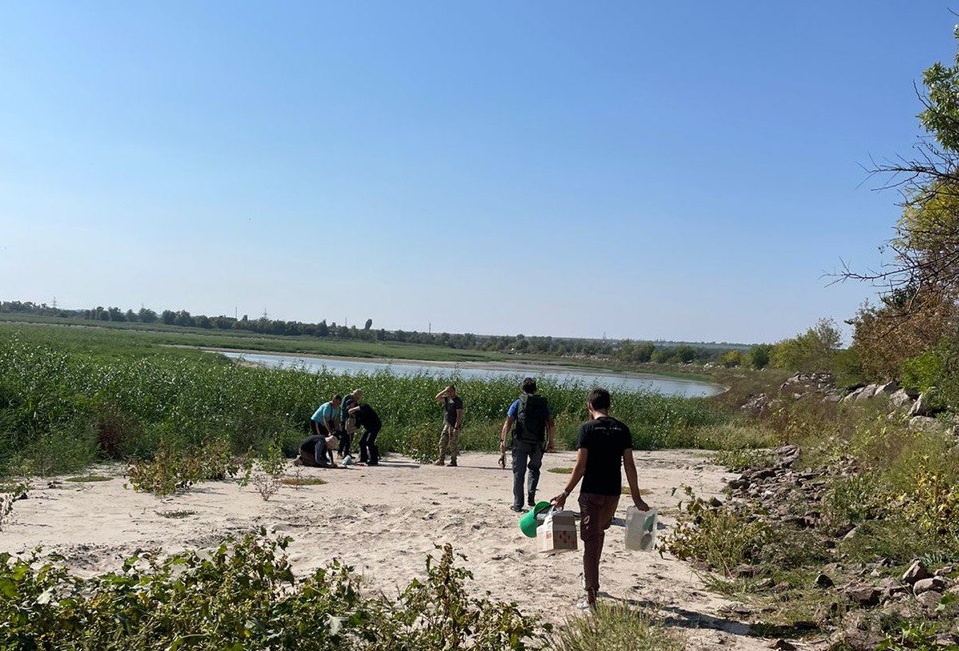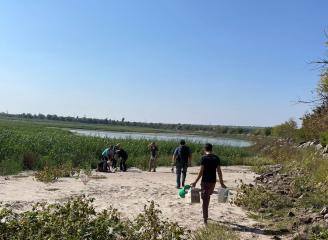Recreating the Kakhovka reservoir has no alternative
According to leading scientists from the National Academy of Sciences (NAS) and the National Academy of Agrarian Sciences (NAAS) of Ukraine. They recently conducted field research on of the Kakhovka reservoir floor, initiated by Ukrhydroenergo.

Leading Ukrainian scientists conducted extensive research in August-October 2023, collecting water and soil samples and studying the main ecological groups of aquatic organisms. This research covered the residual water bodies in the former reservoir bed and the flowing or semi-flowing water bodies connected to the Dnipro River. The research team included experts from various NAS and NAAS institutes, including the Institute of Hydrobiology, Institute of Water Problems and Melioration, Institute of Geochemistry of the Environment, Institute of Fisheries, Institute of Zoology named after I.I. Schmalhausen, Institute of Archaeology, as well as specialists from the State Environmental Academy of Postgraduate Education and Management and the Research Institute "State Water Ecology."
"This research represents the first comprehensive study of the Kakhovka Reservoir following the station's destruction and the loss of the reservoir. During the presentation of the preliminary results, all researchers unanimously expressed their view," said Vasil Korotetsky, the Vice-Rector of the State Environmental Academy of Postgraduate Education and Management, "that to prevent the spread of negative consequences for human life quality, environmental degradation, and economic decline, there is currently no alternative to the restoration of the Kakhovka Reservoir."
The scientists are in the final stages of preparing key recommendations for the reservoir reconstruction, emphasizing the urgent need to refill the Kakhovka Reservoir to its original parameters.
"It is imperative to refill the Kakhovka Reservoir urgently to ensure its full functionality. Further delay could lead to irreversible negative consequences. With our top ecologists, hydrologists, and land reclamation experts, we have determined there is no sense in leaving the dried-up Kakhovka Reservoir bed to grow some plants or merely observe it. It needs to be refilled with water. This will revive life for the population and the unique aquatic ecosystem," emphasized Dr. Elena Sidorenko, a Doctor of Technical Sciences and a Professor.
According to experts, along with refilling the Kakhovka Reservoir, it is essential to modernize and rebuild the water drainage and supply systems for the population's drinking, agricultural, and industrial needs. Continuous monitoring of water quality during the refilling process is crucial.
"For our country, the restoration of the Kakhovka Reservoir is essential to address four critical issues: providing the population of Ukraine with drinking water, restoring navigation on the Dnipro River, ensuring water supply to maintain water levels in the cooling ponds of the Zaporizhzhia Nuclear Power Plant, and supplying water to Crimea. To address all these issues, a dam is necessary to accumulate the water lost after the Kakhovka Hydropower Plant explosion. Energy is currently fifth in the list of priority issues. Therefore, it is essential to build temporary hydrotechnical structures to overcome the consequences of the daily disaster that Ukrainians are facing," noted Ihor Syrota, the CEO of Ukrhydroenergo.
The scientists also recommend building fish ladders to facilitate the migration of highly valuable and endangered ichthyofauna species to their spawning grounds and creating artificial spawning grounds within the Kakhovka Reservoir area for their self-reproduction. An important aspect highlighted by the researchers is the need to develop a program for a natural-artificial bio-reclamation complex for the Kakhovka Reservoir to ensure water quality and the revival of the fishery potential.
It is crucial to continue conducting comprehensive scientific research on the Kakhovka Reservoir's territory.
On July 18, 2023, the Cabinet of Ministers adopted a resolution regarding the implementation of an experimental project for constructing the Kakhovka Hydroelectric Complex on the Dnieper River. Ukrhydroenergo, in cooperation with Ukrhydroproject and the State Environmental Academy of Postgraduate Education and Management, is working to develop recommendations for a comprehensive assessment of the current state of the Kakhovka reservoir and its surrounding areas.
